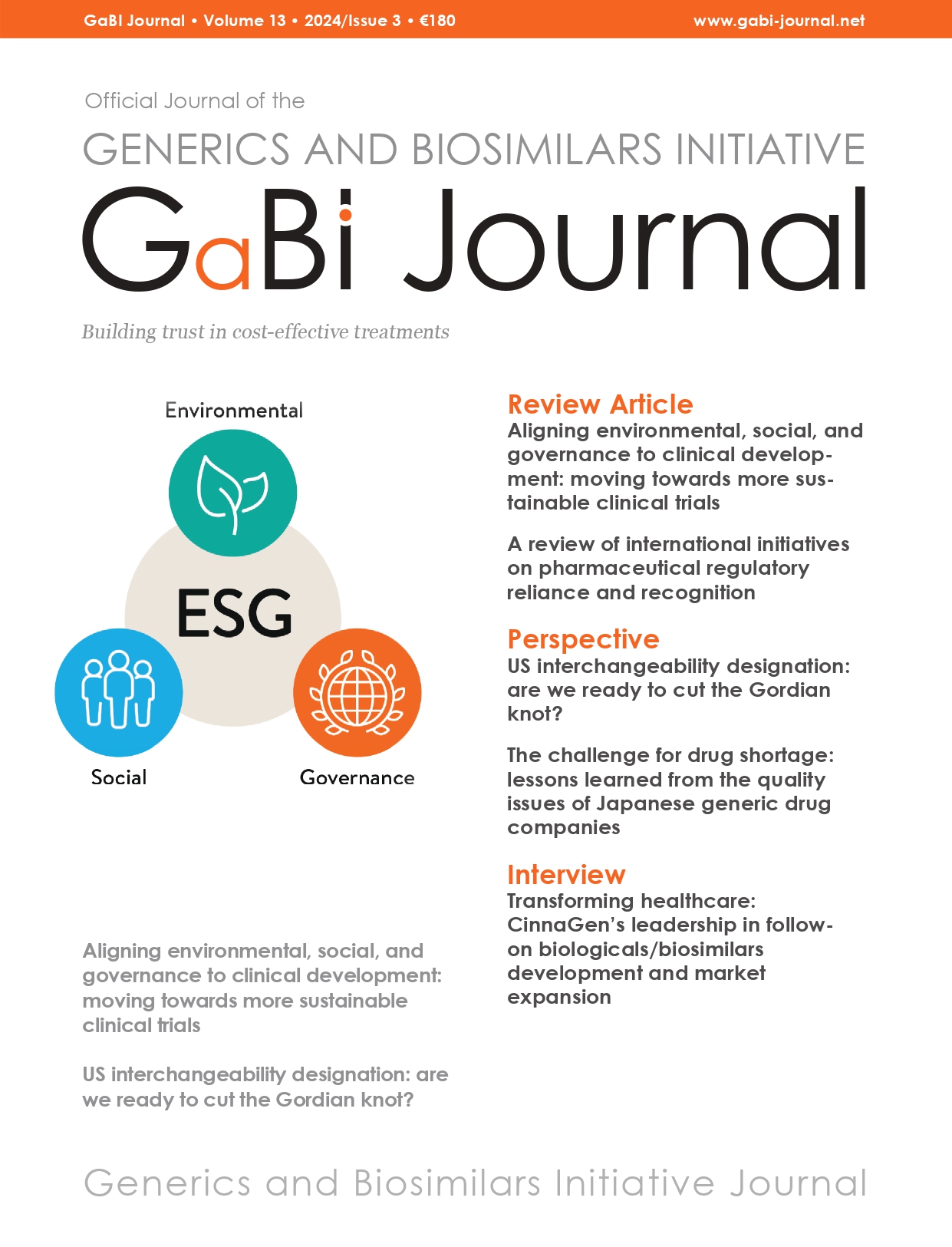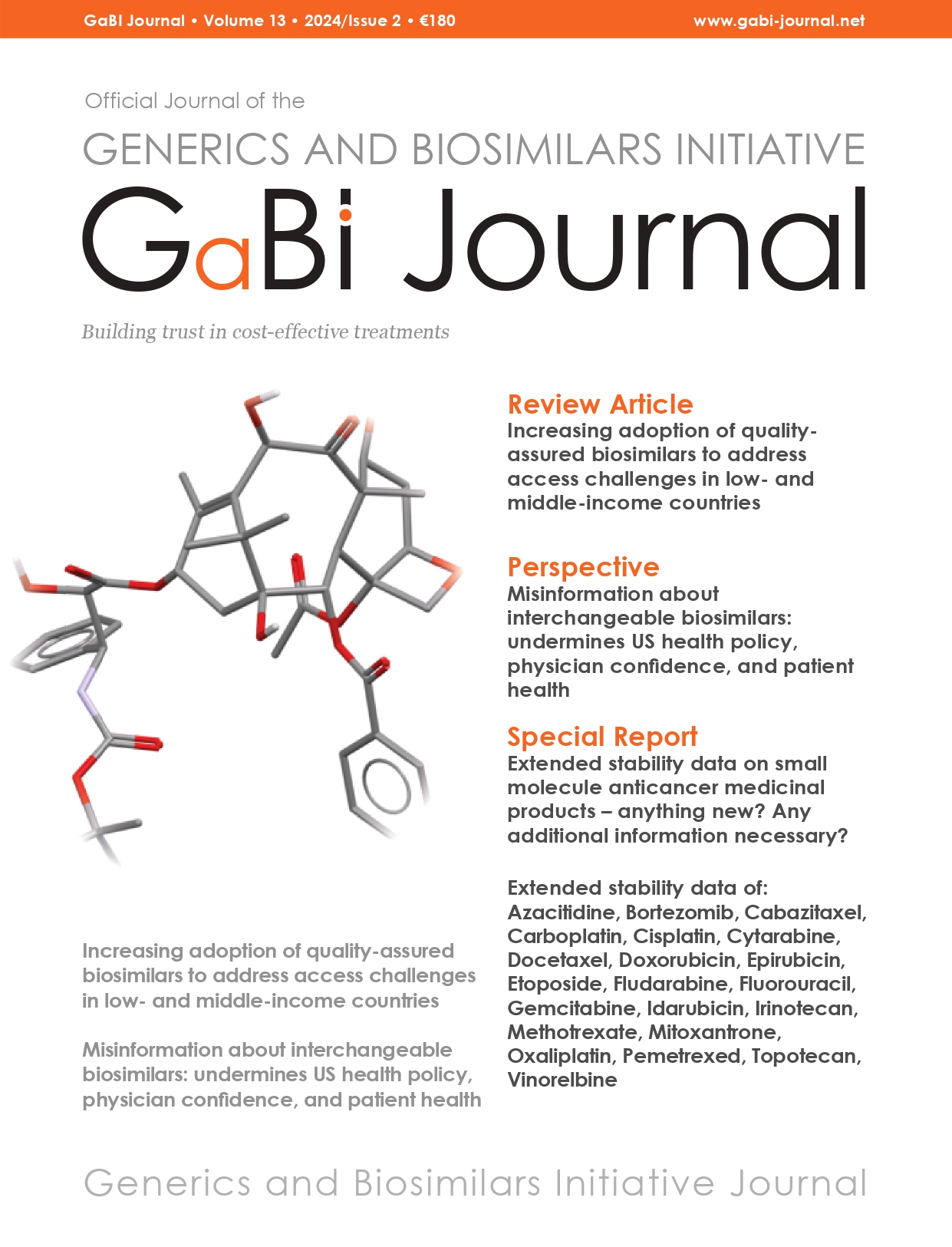Innovator companies should focus on innovations
Published on 2012/02/14
Generics and Biosimilars Initiative Journal (GaBI Journal). 2012;1(1):6.
| Abstract: Despite biopharmaceuticals having an enormous potential value for our health, they have also become a serious threat to our healthcare systems. |
Submitted: 22 June 2011; Revised manuscript received: 6 October 2011; Accepted: 11 October 2011
Recombinant drugs, or biologicals as they are widely termed, are highly complex drug substances that have added tremendous treatment opportunities to modern medicine. However, introducing these highly complex molecules into a patient is a high-risk medical intervention, particularly because recombinant proteins have additional immunological risks compared to most, if not all, small molecules. This is certainly the case when an original product is clinically tested in first-in-human trials. Fortunately, we have learned that the risks far outweigh the benefits for conditions where no other treatments are available.
Most recombinant drugs are very expensive, which can only be explained in part by the costs accrued during their development and manufacture. These costs put a tremendous burden on healthcare systems and it is clear that many patients who could benefit from such therapy with a recombinant drug are left untreated if neither they nor their healthcare system can afford to pay. Some therapies can cost up to Euros 500,000 or more per patient per year of therapy [1]. This cost may be warranted due to the potential benefits the drug can deliver and the initial investment when the medicine is innovative and new, but such high costs cannot be justified in the very long term.
Without a doubt, developing a biosimilar is much more complex than developing a generic version of non-biological drugs [2]. A highly controlled manufacturing process is intrinsically important to biotech medicines as even minor variations in manufacturing or production can result in vastly different products with deleterious, or in some cases highly favourable results, such as better tolerability or efficacy [3].
Once the possibility of efficacious treatment within an acceptable safety profile has been demonstrated, competitors may enter the market, occasionally even while the original molecule is still protected by patents. This is possible because, in many cases, a whole variety of different proteins can solve the same clinical problem. For example, six structurally very different tumour necrosis factor-alpha antagonists compete in the market for the treatment of chronic inflammatory diseases and several more are in the pipeline [4]. All these molecules are innovations as the molecules are structurally very different, but all have turned out to be reasonably well tolerated and more or less equally efficacious and all were consequently approved by authorities in Europe and the US.
Due to the less stringent regulatory requirements of biosimilars and the time required for research, the price of these can be significantly lower than the innovator. By introducing these less expensive biosimilars into the market, the price of the innovator is also often reduced due to this market competition and is a reasonable tool to keep medicines at an affordable cost.
In my opinion, innovator companies should concentrate on innovations—and the potential for innovation is enormous. There are many unmet medical needs waiting for innovative intervention options and there is always a potential for improving on the characteristics of the molecules towards second or third generation drugs. This is both an opportunity for seriously ill patients and a chance for our healthcare system as well.
References
1. Bailey L. An overview of enzyme replacement therapy for dysosomal storage diseases. OJIN. 2008;13(1):3. doi:10.3912/OJIN.Vol13No01Man03
2. Crommelin D, et al. Pharmaceutical evaluation of biosimilars: important differences from generic low-molecular-weight pharmaceuticals. Eur J Hosp Pharm Sci. 2005;11(1):11-7.
3. Robinson CJ, Jones C. Quality control and analytical techniques for biopharmaceuticals. Bioanalysis. 2011;3:81-95.
4. Nam JL, Winthrop KL, van Vollenhoven RF, et al. Current evidence for the management of rheumatoid arthritis with biological disease-modifying antirheumatic drugs: a systematic literature review informing the EULAR recommendations for the management of RA. Ann Rheum Dis. 2010;69:976-86.
|
Author: Professor Theodor Dingermann, PhD, Institute of Pharmaceutical Biology, Biocenter, Gebaeude N230, 306, 9 Max-von-Laue Strasse, DE-60438 Frankfurt/Main, Germany |
Disclosure of Conflict of Interest Statement is available upon request.
Permission granted to reproduce for personal and non-commercial use only. All other reproduction, copy or reprinting of all or part of any ‘Content’ found on this website is strictly prohibited without the prior consent of the publisher. Contact the publisher to obtain permission before redistributing.


